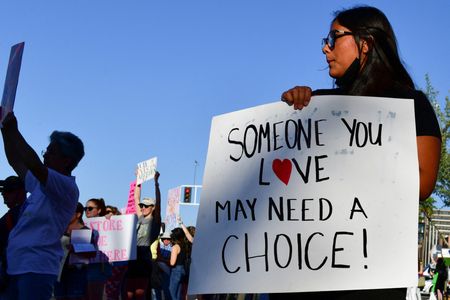By Ahmed Aboulenein
WASHINGTON (Reuters) -U.S. President Joe Biden’s administration issued a final rule on Monday aimed at strengthening privacy protections for women seeking abortions that bans the disclosure of protected health information related to reproductive health.
The new rule, issued through the Office for Civil Rights at the U.S. Department of Health and Human Services, strengthens existing provisions under the Health Insurance Portability Act of 1996 (HIPAA) privacy rule.
It is aimed at protecting women living in states where abortion is illegal who travel out of state to have the procedure legally done, a number that has grown since states started restricting abortion rights.
According to the Guttmacher Institute, a research group that supports abortion rights, about 92,100 women crossed state lines for an abortion in the first half of 2023 – more than double the number during a similar period in 2020.
Some states, like Alabama, Texas, Oklahoma and Idaho, have sought to stop that by making it a crime to help, or pay for, such travel. Lawsuits over such measures are pending in Alabama and Idaho.
The rule also protects healthcare providers, insurers, or other entities which perform or pay for abortions.
Biden said no one should have their medical records “used against them, their doctor, or their loved one just because they sought or received lawful reproductive health care.”
Secretary of Health and Human Services Xavier Becerra said at a news conference announcing the rule that “each and every American still has a right to their privacy, especially when it comes to their very private, very personal health information.”
It specifically bans the use of protected health information related to reproductive care when sought to identify, investigate or punish individuals, providers, or others seeking to obtain, provide, or otherwise facilitate reproductive healthcare such as abortions.
The rule only applies to situations where the care was provided under lawful circumstances, meaning it would not apply to abortions taking place in states where the procedure is banned, for example, but it would still apply to people from those states who obtain an out-of-state abortion.
The department initially proposed the rule last year. The final rule added a provision protecting providers in states where abortion is illegal if their patients receive one out of state, since they did not provide the care, and shields them from having to disclose those abortions to state authorities.
Similar past actions by the department have been taken to court by anti-abortion groups and it is likely this rule will also be litigated. Becerra did not respond to a question about how his department was preparing for that.
(Reporting by Ahmed Aboulenein; Editing by Andrea Ricci and Himani Sarkar)
Brought to you by www.srnnews.com








